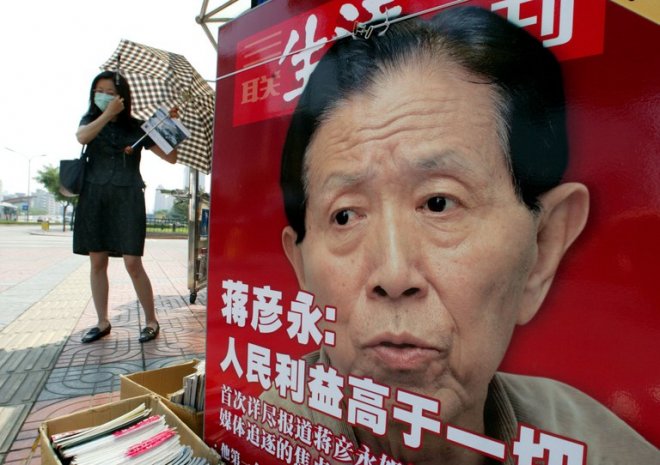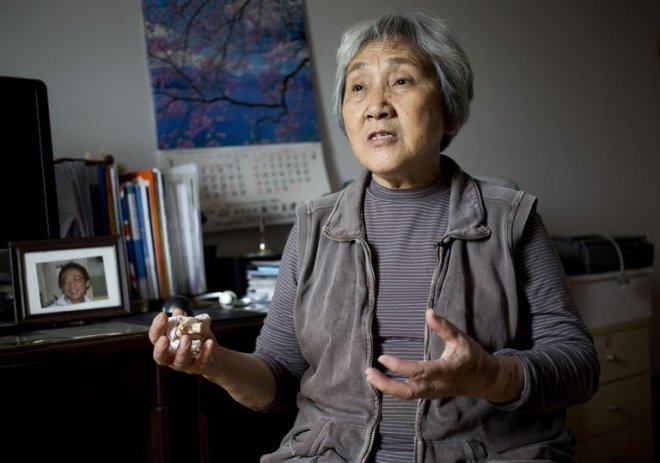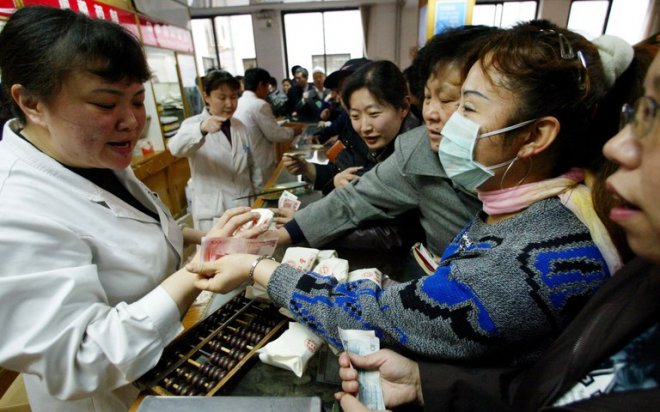Chinese authorities censor funeral of military doctor who broke silence on SARS*
Authorities in Beijing have placed tight restrictions on the funeral arrangements for Jiang Yanyong, a retired military doctor who blew the whistle on the ruling Chinese Communist Party"s cover-up of the 2003 Severe Acute Respiratory Syndrome, or SARS, outbreak, and who criticized the Tiananmen massacre as a "crime" in a letter to supreme leader Xi Jinping.
Jiang, a former professor of surgery at the People"s Liberation Army General Hospital, died of illness in the Chinese capital at 3.39 p.m. local time on March 11, at the age of 87, people close to his family told Radio Free Asia.
Officials put heavy pressure on his family to take a "low-key approach" to his funeral, denying them a cremation slot at the Babaoshan Revolutionary Cemetery, where high-ranking officials and political figures are usually laid to rest, they said.
"No [public] funeral ceremony will be allowed; only relatives may take part," a directive sent to Jiang"s family last week said, adding: "There will be no floral tributes allowed from the general public, and no media interviews given."
The private funeral will take place instead in a purpose-built room in the west wing of the People"s Liberation Army General Hospital on Wednesday, a person close to the matter told Radio Free Asia.
"All floral tributes and elegiac verses are to be handed over to Jiang"s widow Hua Zhongwei before March 14, then passed onto the hospital authorities for review," the person cited the directive as saying.
"The eulogy has already been written," they said.
Called for reappraisal of Tiananmen Square
In 1989, Jiang was a surgeon in active service at the Chinese People"s Liberation Army General Hospital in Beijing, also known as the PLA 301 Hospital, where he took part in the rescue and treatment of the injured during the massacre, which began on the night of June 3.
Jiang later shot to fame in 2003 as the doctor who blew the whistle on a massive cover-up by Chinese health authorities of the extent of the SARS outbreak that year.
![]()
A Chinese woman adjusts her face mask at a newspaper stall featuring a photo of Dr. Jiang Yanyong in Beijing, June 5, 2003. At a time when the former health minister, Zhang Wenkang, was saying that Beijing had only 12 SARS cases and that the disease was under effective control, Dr. Jiang told the media that more than 100 SARS patients were being treated in a few military hospitals alone and that many had died. The Chinese characters on the paper read "Jiang Yanyong – Benefiting the people is our top priority." Credit: Reuters
On Feb. 24, 2004, he threw the full weight of his fame behind renewed calls for an official reappraisal of the Tiananmen Square protests as a "patriotic movement," risking a happy and peaceful retirement to do so, according to his family.
"He kept calling for a reappraisal of the official verdict on the 1989 student movement, which he thought was a huge mistake on the part of the Chinese Communist Party," the person close to Jiang"s family said.
"The authorities put restrictions on his freedom many times over the last 20 years ... although he was still allowed to talk to the media until 2019," they said.
House arrest
Jiang was placed under house arrest soon after his letter to Xi and subsequent interviews with the Hong Kong media, and held incommunicado, with no phone contact with the outside world, the person said.
"Even his son wasn"t allowed to contact him for a whole month, and this really affected Dr. Jiang, and his mood," they said. "Later in life, he suffered from Alzheimer"s and ... wasn"t even allowed to go out of the hospital for a doctor"s appointment ... they lived in the living quarters of the 301 Hospital."
"Recently, he was admitted to the high-ranking ward of the 301 Hospital after contracting pneumonia," the person said. "Dr. Jiang died very suddenly – he had never had pneumonia before that, and I"m guessing it was due to COVID-19."
China has seen a huge wave of COVID-19 infections since it lifted its draconian zero-COVID policies in December 2022, following nationwide protests at the end of November. The World Health Organization warned in late January that the number of related deaths was likely far higher than those being reported, in the absence of mass compulsory testing.
Healthcare workers across China have also told Radio Free Asia that they are seeing large numbers of people seriously ill after being reinfected with the Omicron variant of COVID-19, citing the damage wreaked by COVID-19 on the immune system.
‘Noble character’
Zhang Xianling, a co-founder of the Tiananmen Mothers group representing the victims of the 1989 Tiananmen massacre, said she thought Jiang was a "noble" person, though she had never met him.
"Everyone knows about what he did," Zhang said. "After he blew the whistle, the government took measures, so [his whistleblowing] was tantamount to saving people"s lives right across the country."
![]()
Zhang Xianling, a co-founder of the Tiananmen Mothers group representing the victims of the 1989 Tiananmen massacre, said Jiang Yanyong was a "noble" person for calling for an official reappraisal of the Tiananmen protests as a "patriotic movement." Credit: Associated Press file photo
"Later, he also spoke out about June 4, 1989, on two or three occasions," she said. "For a member of the Communist Party to stand up for justice and speak out for the people like he did shows him to be a person of very noble character."
Zhou Fengsuo, a former student leader in the 1989 protest movement and now executive director of the U.S.-based Human Rights in China, said Jiang was one of the few Chinese doctors to testify in public to the number of deaths and injuries he saw after the People"s Liberation Army put down the peaceful protests with machine guns and tanks.
"There were more than 40 hospitals that received patients during the June 4 massacre, which means that nearly 1,000 doctors would have been involved," Zhou said. "We know the names of some of them."
"But only Jiang Yanyong was brave enough to testify in public, to abandon all claim to status and reputation by doing so, because he would definitely run afoul of the Chinese Communist Party," he said.
"He followed his own conscience and stuck to the truth, which naturally meant he had widespread support," Zhou said.
Letter to Xi
In his 2019 letter to Xi, Jiang said he had seen 89 patients with gunshot wounds in the emergency room of the 301 Hospital in the space of two hours, seven of whom died, a passage that Zhou cited as particularly courageous.
Public memorials and discussion of the events of June 1989 are still largely banned in mainland China, with activists who seek to commemorate the bloodshed often detained, with veteran dissidents placed under police surveillance or detention ahead of each anniversary.
![]()
Beijing residents crowd a Chinese pharmacy to buy traditional herbal medicine, which they believe can help prevent infection by SARS, April 9, 2003. Credit: Reuters
In 2004, Jiang won the Ramon Magsaysay Award for public service, named for the former president of the Philippines.
"As the virus called Severe Acute Respiratory Syndrome swept unacknowledged into Beijing, he broke China’s habit of silence and forced the truth of SARS into the open," the award website says of Jiang.
"For his bold act, Jiang enjoyed a brief moment of celebrity and was lauded as "China’s pride,"" it said.
"The ... board of trustees recognizes his brave stand for truth in China, spurring life-saving measures to confront and contain the deadly threat of SARS," the award website said.
Translated by Luisetta Mudie. Edited by Malcolm Foster.
 | 喜歡這篇嗎?快分享吧! |
前一頁
後一頁
 A Chinese woman adjusts her face mask at a newspaper stall featuring a photo of Dr. Jiang Yanyong in Beijing, June 5, 2003. At a time when the former health minister, Zhang Wenkang, was saying that Beijing had only 12 SARS cases and that the disease was under effective control, Dr. Jiang told the media that more than 100 SARS patients were being treated in a few military hospitals alone and that many had died. The Chinese characters on the paper read "Jiang Yanyong – Benefiting the people is our top priority." Credit: Reuters
A Chinese woman adjusts her face mask at a newspaper stall featuring a photo of Dr. Jiang Yanyong in Beijing, June 5, 2003. At a time when the former health minister, Zhang Wenkang, was saying that Beijing had only 12 SARS cases and that the disease was under effective control, Dr. Jiang told the media that more than 100 SARS patients were being treated in a few military hospitals alone and that many had died. The Chinese characters on the paper read "Jiang Yanyong – Benefiting the people is our top priority." Credit: Reuters Zhang Xianling, a co-founder of the Tiananmen Mothers group representing the victims of the 1989 Tiananmen massacre, said Jiang Yanyong was a "noble" person for calling for an official reappraisal of the Tiananmen protests as a "patriotic movement." Credit: Associated Press file photo
Zhang Xianling, a co-founder of the Tiananmen Mothers group representing the victims of the 1989 Tiananmen massacre, said Jiang Yanyong was a "noble" person for calling for an official reappraisal of the Tiananmen protests as a "patriotic movement." Credit: Associated Press file photo Beijing residents crowd a Chinese pharmacy to buy traditional herbal medicine, which they believe can help prevent infection by SARS, April 9, 2003. Credit: Reuters
Beijing residents crowd a Chinese pharmacy to buy traditional herbal medicine, which they believe can help prevent infection by SARS, April 9, 2003. Credit: Reuters